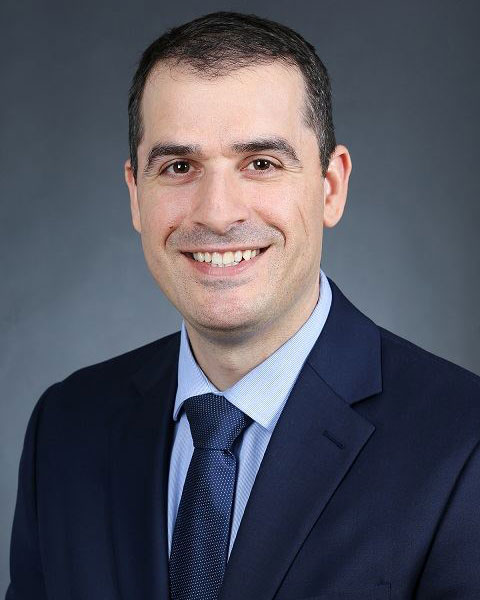“I’m more cautious in listening to my body than I was in the past. I see a brighter picture ahead.”

Mujahid Salam, 68, is no stranger to challenges. He served in the U.S. Army’s 101st Airborne Division, with tours of duty in Korea and Germany in the late 1970s and early '80s. He worked as a counselor in the state Department of Corrections, helping rehabilitate inmates and reintegrate them into daily life.
Salam has also experienced a number of health conditions, including prostate cancer. Yet nothing would challenge him quite like the persistent, serious heartburn that started early in 2021.
“I kept having general discomfort and pain in the center of my chest,” says Salam, an Irvington resident. “It was bad enough that I went to a nearby emergency room three different times.” He was diagnosed with heartburn, a burning sensation caused by acidic or high-fat food and by some medications.
Last October, he was ready to start a night shift for his job as a Mental Health Associate at Newark Beth Israel Medical Center (NBI). He parked his car, but before he could walk inside the building, he felt dizziness and heart palpitations.
“I said, I’m here, so let me just ease on over to the Emergency Department at Newark Beth,” Salam says.
A Surprise Finding
There, a CT scan showed that his heart had become enlarged and there was a large aortic aneurysm, an abnormal dilation of the major aortic vessel in the body. Because Salam’s aneurysm was located in the aortic root—the point where the aorta exits the heart—it also caused stretching of his aortic valve, causing it to leak excessively. That created a significant amount of blood inside his heart, which was subsequently responsible for the cardiac enlargement.

“Aortic aneurysms are asymptomatic in the majority of the cases, and they get diagnosed during a workup for unrelated conditions. When they do cause symptoms, however, pain is the most common. So to have someone present with heartburn as their main symptom like Mr. Salam did is highly unusual,” explains Ioannis Loumiotis, MD, who received advanced training and specializes in aortic surgeries. He also leads the Aortic Center at NBI and for the RWJBarnabas Health Northern Department of Cardiothoracic Surgery, and is a member of RWJBarnabas Health Medical Group.
Salam’s condition needed fast attention. Enlarged aortic aneurysms run the risk of rupturing, which can lead to life-threatening complications such as death, dissection or rupture.
“A normal aorta measures around 3.8 to 4 centimeters in diameter maximum,” Dr. Loumiotis says. “Mr. Salam’s aorta was between 5.5 and 5.6 centimeters.”
A Surgical Solution
Salam knew he’d need surgery. He sought a second opinion after seeing a cardiothoracic surgeon whose approach alarmed him. “The doctor was saying you could die, your heart could explode. I wasn’t comfortable with him. I was shaking in my pants.”
One of Salam’s coworkers told him about Dr. Loumiotis, so he made an appointment. Dr. Loumiotis offered Salam an approach known as valve-sparing aortic root replacement surgery. In this complex procedure, the aortic root is replaced with a graft, and the native valve is sutured inside that graft.
Valve-sparing root replacement surgery, traditionally only offered at major medical centers, is now offered locally by Dr. Loumiotis and the RWJBarnabas Health Northern Region Cardiothoracic Surgery Team at NBI. “With a valve-sparing aortic root replacement, the patient preserves his native heart valve, and thus has a lower risk of infection, reintervention and bleeding compared to traditional valve replacement surgery,” Dr. Loumiotis says.
“Dr. Loumiotis and his team made me feel 100 percent better about having surgery,” Salam says.
Fast Recovery
On Feb. 4, 2022, Dr. Loumiotis performed Salam’s surgery. By early afternoon on Feb. 8, Salam was back home, surrounded by his wife, Khadijah, their six children and 16 grandchildren.
“My nurses at NBI did a job I’ve never seen before,” Salam says. “They took the time to have conversations with me and made sure I was doing everything I was supposed to do. Those little things meant a lot to me.”
“Mr. Salam was committed to his recovery,” Dr. Loumiotis says. “He was out of bed on Day 1 and was pushing himself little by little each day. He’s proof that the more you invest in your recovery, the faster you’ll recover.”
Today, Salam is back to work. “I’d say I’m back to about 75 percent strength, which makes me pretty strong,” he says. He’s driving a car again, walking farther and standing longer than before. And even though his heartburn is still there, he’s taking less medication for it. “I also have a strong appetite,” he says. “I can eat all day and night.”
He credits his care team and his Muslim faith for helping him recover. “I’m more cautious in listening to my body than I was in the past,” he says. “I see a brighter picture ahead.”
Whoever your heart beats for, our hearts beat for you. To connect with a top cardiovascular surgeon at Newark Beth Israel Medical Center, call 888-724-7123.